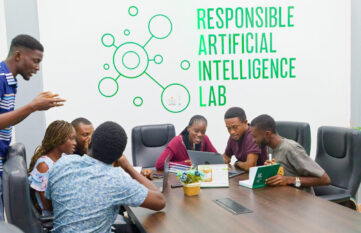© Katie Moum from Unsplash
The Young Leaders in GovTech Award celebrates the next digital transformation talents in the public sector. The decision criteria are based on the nominees’ previous achievements and ideas for the future. The aim of the award by PUBLIC and Tagesspiegel Background is to connect the next generation of experts in the GovTech ecosystem and to learn even more from each other.
Our nominees Janina Kempf, Lisa Hiemer-Maqoma, Riham Fakhry and Sarah Fischer work on global projects for human-centred digital transformation. With their work, they want to reduce inequalities, support democratisation and improve leadership. In this article, the talents introduce themselves and their tasks and give an insight into their purpose.

Janina Kempf
“In a perfect future world, digitising the administration could make four things a reality. First, we will have digitally skilled employees in the administration who will enable effective digital solutions for the administration and its citizens. Second, a digital administration will increase citizen engagement and improve communication and transparency between citizens and government. Third, digitalisation enables governments to deliver services more efficiently and effectively. Fourth, it will strengthen data-driven policy making. It will reduce the “guessing game” of what could be helpful to the citizens.”
“I truly believe that the image of administration needs an update. Of course, I also still associate shelves full of paper work, wooden walls and uninspired offices, which limits our creativity. This of course still exists, but this is changing and I want to be part of this change. Working on and in administration can also mean, meeting in a room full of people from politics, civil society, research and industry to design the government of tomorrow. Looking at the international landscape, everyone can just benefit from collaborating and exchanging with each other.”
Janina advises the German-Indian Digital Dialogue between the German Government and the Indian Ministry of Electronics and IT (MeitY). Together with the political partners, actors from civil society, the private sector and researchers, she shapes important digital policy topics of German-Indian cooperation in the field of eGovernance and eGovernment services. Especially with India’s G20 presidency, the focus of cooperation is on secure and trustworthy digital open goods and infrastructures.

Lisa Hiemer-Maqoma
“eKiosks to pay your public fees and taxes in Georgia, using Minecraft to co-design public spaces with communities in South Africa, the use of human-centred design to co-design e-services in Palestine, an innovation lab in Ukraine to foster innovation between different public institutions – there are many inspiring examples in our partner countries that we can all learn from.”
“We can learn how to innovate in often resource-stricken contexts, contexts with on-going conflicts, often contradicting or not yet elaborated legal frameworks -in a rather young administrative culture. Let’s be bold and challenge our approach towards learning and capacity development – by fostering new forms of strategic partnerships, by acknowledging that GovTech requires a new form of multistakeholderism and designing projects that practically give spaces towards these new forms of learning.”
Lisa is involved in promoting digital governance and innovation in the public sector in partner countries: For example, the BMZ digital project “Inclusive Digital Governance” (INDIGO) in the Palestinian Territories or the “Innovation Lab for EU Association” in Ukraine. In 2020, she won the GIZ Innovation Fund with PartiCipate – a one-stop shop for inclusive citizen participation. In March 2023, she will join the regional project “DataCipation” – with a focus on promoting digital transformation with the AU.

Riham Fakhry
“Once the word “administration” comes up in any context, people start losing interest or worrying about the time they have to spend on such a process. For me, once it is combined with “digital transformation” the whole impression changes. Working to achieve a true digital transformation for the administration is a challenging process as you are trying to transform the boring and inefficient nature of the administration into an efficient and simple one. This requires a lot of problem-solving, analytical thinking and innovation.”
“People might think that digitalisation eliminates the role of humans, on the contrary, it ensures their participation in an efficient way. Different user groups should be involved in this process to ensure its efficiency and relevance, it is exactly as if you develop a new product that no one wants to use or even no one understands – so you just wasted many resources. Therefore, it is very important to understand the foundations and principles of digitalisation and to include users in the process.”
On behalf of the BMZ and in cooperation with the Egyptian government, Riham is advising the digital project “InnoPA – Supporting e-government and innovation in public administration”. With a large number of relevant actors from the European and African ICT ecosystem, it creates the conditions for an inclusive, digital transformation of public administration via human-centred and innovative approaches.

Sarah Fischer
“The GovTech sector holds great democratizing potential. More digital services, if implemented right, can lead to more transparency, accountability and accessibility. A lot of people do not want to travel or stand in a cue for hours to renew their passports or register a business. When I can read news, order food and manage my banking via a couple of clicks – why should I not be able to apply for government services from home?”
“Digitalisation is cross-cutting and influences almost every part of our lives whether it is how we work, how we communicate or how we interact with our governments. The diversity of opportunities that comes with constant technological development has drawn me to the Tech4Good sector and keep the job exciting.”
As project manager, Sarah implements the global GovStack initiative on behalf of the BMZ. Together with the EU and the founding members Estonia, the International Telecommunications Union and the UN Digital Impact Alliance, the lighthouse project of the German Digital Strategy is developing basic digital components for the administration. In addition to India, Singapore and Ukraine, the project is working with 12 countries worldwide.



